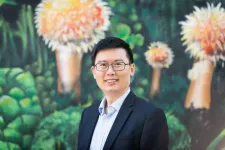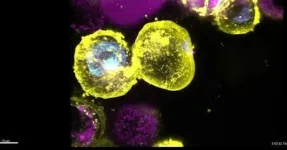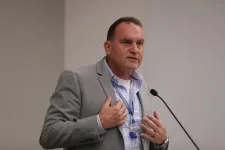(Press-News.org) (MEMPHIS, Tenn. – October 02, 2023) The population of childhood cancer survivors in the U.S. is increasing, with an overall childhood cancer survival rate greater than 85% five years after diagnosis. However, survivors can still be at increased risk of various health conditions, including second cancers. Using data from the Childhood Cancer Survivor Study (CCSS) and the St. Jude Lifetime Cohort Study (St. Jude Life), scientists at St. Jude Children’s Research Hospital have identified a genetic explanation for why a small proportion of survivors are more likely to develop second cancers and why they may be more severe or deadly. The findings, which will inform genetic counseling, testing and adoption of personalized cancer screening and prevention strategies, were published today in The Lancet Oncology.
The St. Jude group showed that survivors with pathogenic (damaging) genetic variants in specific genes, called cancer-predisposing variants, are at an increased risk of developing second, or subsequent, cancers as adults, and those cancers are more likely to be severe and deadly. The scientists had previously identified that survivors with pathogenic variants in one of 60 different cancer-predisposing genes or 127 DNA damage repair genes were more likely to experience a second or subsequent cancer. This study extends that research to show a direct connection between cancer-predisposing variants and increased second-cancer-related mortality.
Many of these genetic variants are known to be causally linked to cancers. For example, the tumor suppressor gene TP53 is one of the 60 genes included in the analysis. The key to the discovery’s utility is that these variants are present in the DNA of patients when diagnosed with cancer as children, allowing for an individualized medicine approach to be developed early in life for each survivor. By better understanding the effect such genes can have on future cancer risk and its outcome beyond the primary childhood cancer, the study will help inform efforts to prevent second cancers and improve the outcomes in these individuals.
“Our study pinpoints that clinical genetic testing to screen for and identify if survivors are carriers of these pathogenic variants could lead to screening and early interventions for those at higher risk to develop deadly second cancers, potentially saving their lives,” said senior corresponding author Zhaoming Wang, Ph.D., St. Jude Department of Epidemiology and Cancer Control.
Cancer prevention in adult childhood cancer survivors
The total number of childhood cancer survivors who develop second or subsequent cancers is small (<10% based on current studies), and the percentage of survivors who carry cancer-predisposing variants is low (~6%). Together, these factors have made it extremely challenging to study and understand the genetic risks for second cancers and their outcome in this population. To reach statistically meaningful results, Wang and his collaborators combined whole genome/exome sequencing and clinical data from over twelve thousand survivors of childhood cancer. The study combined data from North America’s two largest survivorship studies, the CCSS and St. Jude LIFE cohorts.
“This is the first comprehensive study looking for the genetic reason for late mortality — specifically late mortality due to second cancers,” Wang said. “Now we know that cancer-predisposing variants contribute to the risk of death from second cancer.”
Increased surveillance may help limit the impact of these cancer-predisposing variants as childhood cancer survivors grow into adulthood. By knowing which survivors are at greater risk, health care providers may be able to recommend personalized cancer screening, which may lead to the detection of additional cancers at their earliest and most treatable stage.
These variants are part of the inherited, or germline, DNA that people are born with. This means they can be detected in children when they are first diagnosed with childhood cancers, arming survivors with the knowledge they need to lower their risk later in life.
“Even before finishing childhood cancer treatment, clinicians can recommend referral to do genetic counseling so that survivors with these variants can seek cancer prevention strategies later on,” Wang said. “Depending on the gene harboring the variant, survivors that are carriers may be able to implement prevention strategies to safeguard their long-term health.”
Authors and funding
The study’s co-first authors are Cheng Chen, of Shanghai Jiao Tong University School of Medicine; Na Qin, of Nanjing Medical University; and Mingjuan Wang, of St. Jude. The other co-senior authors are Hui Wang, Shanghai Jiao Tong University School of Medicine; Deo Kumar Srivastava and Leslie L. Robison (Emeritus Faculty), St. Jude. The study’s other authors are Qian Dong, Saima Sultana Tithi, Yawei Hui, Wenan Chen, Gang Wu, Dennis Kennetz, Michael Edmonson, Michael Rusch, Andrew Thrasher, John Easton, Heather Mulder, Noel-Marie Plonski, Kyla Shelton, Matthew Ehrhardt, Kim E. Nichols, Yutaka Yasui, Gregory Armstrong, Kirsten Ness, Melissa Hudson and Jinghui Zhang, St. Jude; Nan Song, Chungbuk National University; Cindy Im, University of Minnesota; Wendy Leisenring and Kayla Stratton, Fred Hutchinson Cancer Research Center; Rebecca Howell, The University of Texas MD Anderson Cancer Center; Smita Bhatia, University of Alabama at Birmingham.
The study was supported by grants from the National Institutes of Health (CA195547, CA55727 and CA021765) and ALSAC, the fundraising and awareness organization of St. Jude.
St. Jude Media Relations Contacts
Chelsea Bryant
Desk: (901) 595-0564
chelsea.bryant@stjude.org
media@stjude.org
Rae Lyn Rushing
Cell: (901) 686-2597
raelyn.rushing@stjude.org
media@stjude.org
St. Jude Children's Research Hospital
St. Jude Children's Research Hospital is leading the way the world understands, treats and cures childhood cancer, sickle cell disease and other life-threatening disorders. It is the only National Cancer Institute-designated Comprehensive Cancer Center devoted solely to children. Treatments developed at St. Jude have helped push the overall childhood cancer survival rate from 20% to 80% since the hospital opened more than 60 years ago. St. Jude shares the breakthroughs it makes to help doctors and researchers at local hospitals and cancer centers around the world improve the quality of treatment and care for even more children. To learn more, visit stjude.org, read St. Jude Progress blog, and follow St. Jude on social media at @stjuderesearch.
END
Host genetics helps explain childhood cancer survivors’ mortality risk from second cancers
2023-10-03
ELSE PRESS RELEASES FROM THIS DATE:
How floods kill, long after the water has gone – global decade-long study
2023-10-03
With New York declared a state of emergency following flash flooding, there is increasing concern such events will become more common globally.
Now a study led by Monash University scientists in Australia has found that people impacted by a flooding event are at significantly increased risk of dying – including heart and lung problems – in a crucial window between three and six weeks after the event, even after the flooding has dissipated.
The study, published today in the BMJ, found that the risk of dying increased and persisted for up to 60 days (50 days for cardiovascular mortality) after a flooded day - increasing by for 2.1% for all-cause deaths, 2.6% for cardiovascular ...
USC joins LA-area stem cell institutes in forming a regenerative medicine consortium
2023-10-03
USC is partnering with seven of Los Angeles’ leading regenerative medicine institutes to form the Los Angeles and surrounding area regenerative medicine consortium (LA-RMC), with the goal of fulfilling the promise of the California Institute for Regenerative Medicine (CIRM): to develop laboratory discoveries into treatments for patients with unmet medical needs.
CIRM, the voter-created agency that provides public funding for stem cell research in California, is dedicated to advancing regenerative medicine, which uses stem cells and related approaches to treat disease and disorders. Regenerative ...
When cells go boom: study reveals inflammation-causing gene carried by millions
2023-10-03
Australian researchers at WEHI have found that a genetic change that increases the risk of inflammation, through a process described as ‘explosive’ cell death, is carried by up to 3% of the global population.
The study may explain why some people have an increased chance of developing conditions like inflammatory bowel disease or suffer more severe reactions to infections with bacteria like Salmonella.
At a glance
MLKL is a gene essential to triggering necroptotic cell death – a natural process that protects our body from infection. In some people this process can go awry and ...
Study from Fukushima shows even low doses of radiation may contribute to diabetes
2023-10-03
New research to be presented at this year’s Annual Meeting of The European Association for the Study of Diabetes (EASD), Hamburg (2-6 Oct), suggests that exposure to low doses of radiation may contribute to an increased risk of diabetes.
The study by Dr Huan Hu and Dr Toshiteru Ohkubo from the Japanese National Institute of Occupational Safety and Health involved more than 6,000 out of around 20,000 emergency workers who responded to the radiation accident at the Fukushima Daiichi Nuclear Power Plant, which was hit by a huge tsunami in March 2011.
Substantial amounts of radioactive materials were released into the environment following explosions at the ...
Worldwide audit finds testosterone replacement improves blood sugar control in men with type 2 diabetes
2023-10-03
Real-world data from an ongoing international audit of testosterone deficiency in men with type 2 diabetes, being presented at this year’s Annual Meeting of The European Association for the Study of Diabetes (EASD), Hamburg (2-6 Oct), suggests that testosterone replacement therapy (TRT) improves glycaemic control for up to 2 years.
The early data from 37 centres across 8 countries who have so far joined the Association of British Clinical Diabetologists (ABCD) audit [1], suggest that the reason that HbA1c (a measure of average blood sugar levels over the past 2-3 months) continues ...
Semaglutide significantly improves blood sugar control and weight loss in adults with type 2 diabetes for up to 3 years in real-world study
2023-10-03
New research presented at this year’s Annual Meeting of The European Association for the Study of Diabetes (EASD), Hamburg (2-6 Oct), shows that treatment with the drug semaglutide significantly improves blood sugar control and weight loss in adults with type 2 diabetes for up to three years.
“Our long-term analysis of semaglutide in a large and diverse cohort of patients with type 2 diabetes found a clinically relevant improvement in blood sugar control and weight loss after 6 months of treatment, comparable with that seen in randomised trials”, says Professor Avraham Karasik from the Institute of Research and Innovation at Maccabi Health Services ...
Drinking dark tea every day may help control blood sugar to reduce diabetes risk
2023-10-03
Drinking dark tea every day may help to mitigate type 2 diabetes risk and progression in adults through better blood sugar control, suggests new research at this year’s Annual Meeting of The European Association for the Study of Diabetes (EASD), Hamburg (2-6 Oct).
The study, by researchers from the University of Adelaide in Australia and Southeast University in China, found that compared with never tea drinkers, daily consumers of dark tea had 53% lower risk for prediabetes and 47% reduced risk for type 2 diabetes, even after taking into account established risk factors known to drive the risk for diabetes, including age, ...
UC Riverside startup company wins prestigious NIH grant
2023-10-02
Soon after he joined UC Riverside in 2015, Maurizio Pellecchia, a professor of biomedical sciences in the UCR School of Medicine, began working with the UCR Research and Economic Development office to create on campus an incubator space. He envisioned that space as a home for UCR scientists to create startup companies to prove the commercial potential of their technologies. That multi-year effort helped create in the Multidisciplinary Research Building the EPIC Life Sciences Incubator that currently houses young companies in agricultural technology, biomedical technologies, bioengineering, and medicinal chemistry.
One of the tenant companies in the incubator ...
DNA from discarded whale bones suggests loss of genetic diversity due to commercial whaling
2023-10-02
Commercial whaling in the 20th century decimated populations of large whales but also appears to have had a lasting impact on the genetic diversity of today’s surviving whales, new research from Oregon State University shows.
Researchers compared DNA from a collection of whale bones found on beaches near abandoned whaling stations on South Georgia Island in the south Atlantic Ocean to DNA from whales in the present-day population and found strong evidence of loss of maternal DNA lineages among blue and humpback whales.
“A maternal lineage is often associated with an animal’s cultural memories such as feeding and breeding locations that are passed from one generation ...
Viruses dynamic and changing after dry soils are watered
2023-10-02
Viruses in soil may not be as destructive to bacteria as once thought and could instead act like lawnmowers, culling older cells and giving space for new growth, according to research out of the University of California, Davis, published Sept. 28 in the journal Nature Ecology and Evolution.
How viruses affect ecosystems, including bacteria, is challenging to untangle because they are complex and change over time and space. But the first annual rain on Mediterranean ecosystems, such as those in California, offers a kind of reset, triggering activity that can be observed.
Scientists ...







